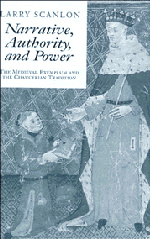4 - The sermon exemplum
Published online by Cambridge University Press: 16 September 2009
Summary
The exemplum appears in nearly every form of serious medieval discourse, and is parodied in comic forms such as the fabliau and the beast fable. Within this broad cultural propensity, it is possible to discern two central strands. The first is the sermon exemplum, which evolved out of the earlier monastic tradition initiated by Gregory's Dialogues. The second is usually described as the classical exemplum, but I will call it the public exemplum. The public exemplum was most prominent in the Fürstenspiegel, the Mirrors of Princes, but also occurred in other political, ecclesiological and historiographical contexts. In modern scholarship, these two strands have been treated as entirely distinct. The sermon exemplum is usually the province of folklorists and social historians; the public exemplum, of intellectual historians. There is a good deal of justification to this separation. The sermon exemplum draws most of its material from folkloric and hagiographic traditions; the public exemplum from classical antiquity.
Nevertheless, this separation also completely obscures the exemplum's considerable political significance. Viewed as folklore, the sermon exemplum becomes spontaneous and unself-conscious, the product of an undifferentiated popular imagination, without any specifiable political interest. The public exemplum, by contrast, is viewed as self-consciously learned, but for that very reason, equally apolitical. It becomes the vehicle for the timeless moral teachings of classical tradition. This folklore/learned dichotomy reproduces the high modernist distinction between high and low culture, and should be suspect for that reason alone.
- Type
- Chapter
- Information
- Narrative, Authority and PowerThe Medieval Exemplum and the Chaucerian Tradition, pp. 57 - 80Publisher: Cambridge University PressPrint publication year: 1994



